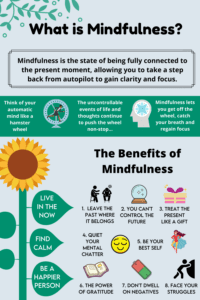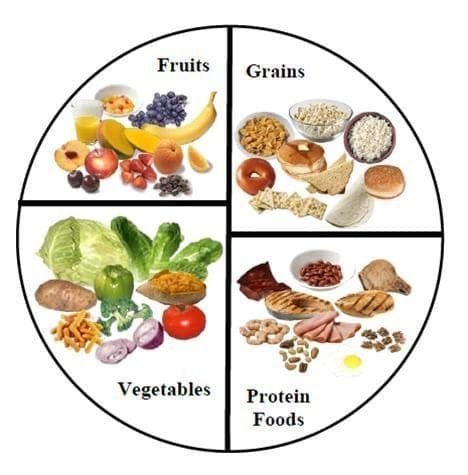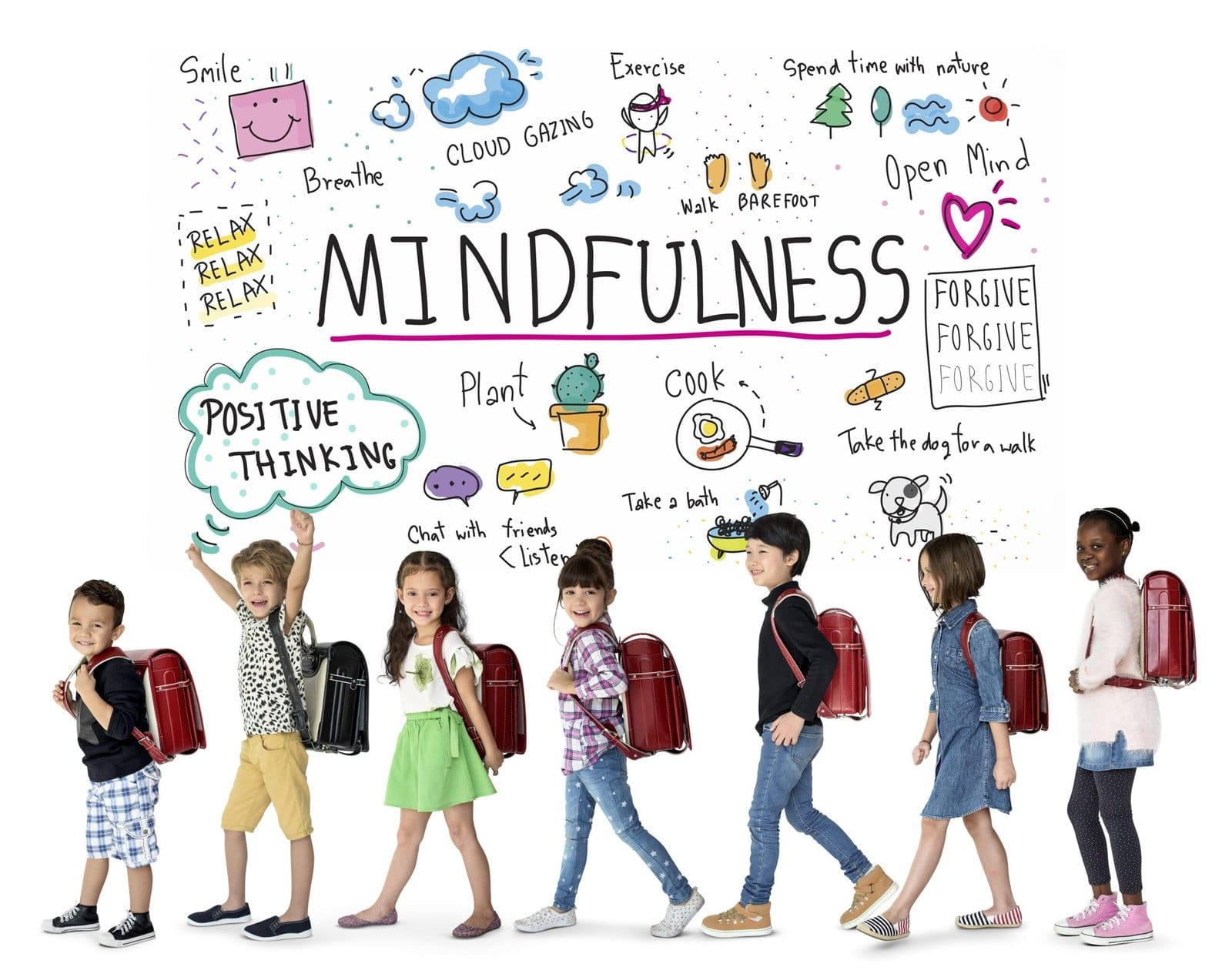Unlocking the Power of Mindfulness: Enhancing Focus and Emotional Resilience for Transformation
Introduction to Mindfulness
The benefits of mindfulness in today’s fast-paced and hectic world are significant. As we seek balance and meaning in our lives, mindfulness emerges as a powerful tool to assist us. But what exactly is mindfulness? It is the practice of intentionally bringing our attention to the present moment, without judgment. This involves being fully aware of our thoughts, feelings, bodily sensations, and the surrounding environment. By cultivating mindfulness, we can enjoy improved mental clarity, reduced stress, enhanced emotional intelligence, and a stronger connection with ourselves and others. Such practice leads to a deeper understanding of ourselves and the world around us, fostering a more balanced and meaningful life.
What is Mindfulness?
Mindfulness is the art of paying attention on purpose. It is about being fully present in the here and now, rather than being lost in thoughts about the past or worries about the future. By directing our attention to the present moment, we can experience life more fully and deeply. Mindfulness is not about trying to change our thoughts or feelings, but rather about accepting them as they are, without judgment. It is about developing a non-reactive and compassionate stance towards ourselves and others.
The Benefits of Practicing Mindfulness
The practice of mindfulness offers a wide range of benefits for our physical, mental, and emotional well-being. Research has shown that regular mindfulness practice can reduce stress, anxiety, and depression. It can also improve our attention span, cognitive abilities, and overall happiness. By cultivating mindfulness, we can become more aware of our automatic patterns of thinking and behaving, and gain the ability to respond to life’s challenges with greater clarity and wisdom. Mindfulness also enhances our relationships by improving our ability to listen, empathize, and communicate effectively.
Mindfulness for Beginners: How to Start Practicing Mindfulness
If you’re new to mindfulness, getting started can feel overwhelming. But the good news is that mindfulness is a skill that can be developed with practice. Here are a few simple steps to help you begin your mindfulness journey:
- Set aside some dedicated time each day for mindfulness practice. Start with just a few minutes and gradually increase the duration as you become more comfortable.
- Find a quiet and comfortable place where you can sit or lie down without distractions. Close your eyes or keep them open, whatever feels more natural to you.
- Bring your attention to your breath. Notice the sensation of the breath as it enters and leaves your body. Whenever your mind wanders, gently bring it back to the breath without judgment.
- Expand your awareness to include other sensations in your body, such as any tension or discomfort. Observe these sensations without trying to change them.
- Notice any thoughts or emotions that arise, but don’t get caught up in them. Simply observe them as passing phenomena, like clouds in the sky.
By practicing these simple steps, you can begin to develop a foundation of mindfulness in your life.
Mindfulness Exercises for Everyday Life
While dedicated meditation practice is an essential part of mindfulness, it’s also important to bring mindfulness into our everyday activities. Here are a few mindfulness exercises you can incorporate into your daily life:
- Mindful Eating: Pay attention to the taste, texture, and smell of your food. Chew slowly and savor each bite.
- Mindful Walking: Notice the sensation of your feet touching the ground with each step. Be aware of the sights, sounds, and smells around you as you walk.
- Mindful Listening: When someone is speaking to you, give them your full attention. Listen without interrupting or thinking about what you’re going to say next.
- Mindful Breathing: Throughout the day, take a few moments to pause and bring your attention to your breath. Notice the sensation of the breath as it enters and leaves your body.
By integrating these mindfulness exercises into your daily routine, you can bring a greater sense of presence and awareness to each moment.
Mindfulness in Plain English: Understanding the Core Principles
To deepen your understanding of mindfulness, it can be helpful to explore the core principles behind the practice. Mindfulness is based on several key principles:
- Non-judgment: Cultivating a non-judgmental attitude towards our experiences allows us to observe them without getting caught up in self-criticism or self-blame.
- Acceptance: Accepting things as they are, without trying to change them, creates a sense of inner peace and contentment.
- Beginner’s Mind: Approaching each moment with a sense of curiosity and openness, as if experiencing it for the first time, helps us break free from our preconceived notions and biases.
- Letting Go: Letting go of attachment to thoughts, emotions, and outcomes allows us to experience greater freedom and ease.
By embodying these core principles in our daily lives, we can cultivate a deeper sense of mindfulness and live more fully in the present moment.
Mindfulness and Stress Reduction
One of the key benefits of mindfulness is its ability to reduce stress. When we practice mindfulness, we become more aware of our stress triggers and learn to respond to them in a more skillful way. By cultivating a non-reactive and compassionate stance towards our stressors, we can break free from the cycle of reactivity and create a sense of calm and ease. Mindfulness also helps us develop a greater capacity to tolerate stress and bounce back from challenging situations.
Mindfulness and Emotional Well-being
Mindfulness can also have a profound impact on our emotional well-being. By bringing our attention to our thoughts and emotions, we can develop a greater understanding of their underlying causes and patterns. This awareness allows us to respond to our emotions in a more skillful way, rather than reacting impulsively. Mindfulness also helps us cultivate a sense of self-compassion and acceptance, which can lead to greater emotional resilience and happiness.
Mindfulness and Improved Focus and Productivity
In today’s digital age, distractions are everywhere, making it challenging to stay focused and productive. Mindfulness can help us train our attention and improve our ability to concentrate. By practicing mindfulness, we become more aware of our wandering mind and learn to bring our attention back to the task at hand. This increased focus and concentration can enhance our productivity and efficiency in both our personal and professional lives.
Mindfulness and Relationships
Mindfulness has the power to transform our relationships by improving our ability to listen, empathize, and communicate effectively. When we practice mindfulness, we become more present and attentive in our interactions with others. This deep presence allows us to truly listen to what the other person is saying, without judgment or interruption. Mindfulness also helps us cultivate empathy and compassion, which are essential for building healthy and meaningful relationships.
Mindfulness in Different Aspects of Life: Work, Parenting, and Self-care
Mindfulness can be applied to various aspects of our lives, including work, parenting, and self-care. In the workplace, mindfulness can enhance our focus, creativity, and problem-solving abilities. As parents, mindfulness can help us be more present and patient with our children, and navigate the challenges of parenting with greater ease. And in terms of self-care, mindfulness can support us in developing a greater sense of self-awareness and self-compassion, leading to improved overall well-being.
Resources for Deepening Your Mindfulness Practice
If you’re interested in deepening your mindfulness practice, there are a variety of resources available to support you. Here are a few suggestions:
- Books: “The Miracle of Mindfulness” by Thich Nhat Hanh and “Wherever You Go, There You Are” by Jon Kabat-Zinn are highly recommended for beginners.
- Apps: Insight Timer, Headspace, and Calm are popular mindfulness apps that offer guided meditations, mindfulness exercises, and other resources.
- Courses and Workshops: Many mindfulness teachers and organizations offer courses and workshops that can provide a more structured and in-depth learning experience.
- Mindfulness Retreats: Consider attending a mindfulness retreat to immerse yourself in a supportive and contemplative environment.
Remember, the key to deepening your mindfulness practice is consistency and regularity. Find what works best for you and make it a priority in your daily life.
Conclusion: Embracing Mindfulness for a Balanced and Meaningful Life
In conclusion, mindfulness is a powerful practice that can help us find balance and meaning in our lives. By cultivating mindfulness, we can develop a deeper understanding of ourselves and the world around us. We can reduce stress, improve our emotional well-being, and enhance our focus and productivity. Mindfulness also has the potential to transform our relationships and support us in various aspects of our lives, such as work, parenting, and self-care. So why not embark on this journey towards a balanced and meaningful life? Embrace mindfulness and discover the profound benefits it can bring to your life.
Disclaimer
The content is purely informative and educational in nature and should not be construed as medical advice. Please use the content only in consultation with an appropriate certified medical or healthcare professional

Exploring Mindfulness Practice: Your Path to Balance and Meaning
Introduction to Mindfulness Practice In today’s fast-paced and hectic world, finding balance and meaning in our lives has become more important than ever. One powerful tool that can help us achieve this is mindfulness practice. But what exactly is mindfulness practice? Mindfulness practice is the intentional act of bringing our attention to the present moment, without judgment. It involves being fully aware of our thoughts, feelings, bodily sensations, and the surrounding environment. By cultivating mindfulness practice, we can develop a deeper understanding of ourselves and the world around us, leading to a more balanced and meaningful life. What is Mindfulness? Mindfulness is the art of paying attention on purpose. It is about being fully present in the here and now, rather than being lost in thoughts about the past or worries about the future. By directing our attention to the present moment, we can experience life more fully and deeply. Mindfulness is not about trying to change our thoughts or feelings, but rather about accepting them as they are, without judgment. It is about developing a non-reactive and compassionate stance towards ourselves and others. The Benefits of Practicing Mindfulness The practice of mindfulness offers a wide range of benefits for our physical, mental, and emotional well-being. Research has shown that regular mindfulness practice can reduce stress, anxiety, and depression. It can also improve our attention span, cognitive abilities, and overall happiness. By cultivating mindfulness, we can become more aware of our automatic patterns of thinking and behaving, and gain the ability to respond to life’s challenges with greater clarity and wisdom. Mindfulness also enhances our relationships by improving our ability to listen, empathize, and communicate effectively. Mindfulness for Beginners: How to Start Practicing Mindfulness If you’re new to mindfulness, getting started can feel overwhelming. But the good news is that mindfulness is a skill that can be developed with practice. Here are a few simple steps to help you begin your mindfulness journey: Set aside some dedicated time each day for mindfulness practice. Start with just a few minutes and gradually increase the duration as you become more comfortable. Find a quiet and comfortable place where you can sit or lie down without distractions. Close your eyes or keep them open, whatever feels more natural to you. Bring your attention to your breath. Notice the sensation of the breath as it enters and leaves your body. Whenever your mind wanders, gently bring it back to the breath without judgment. Expand your awareness to include other sensations in your body, such as any tension or discomfort. Observe these sensations without trying to change them. Notice any thoughts or emotions that arise, but don’t get caught up in them. Simply observe them as passing phenomena, like clouds in the sky. By practicing these simple steps, you can begin to develop a foundation of mindfulness in your life. Mindfulness Exercises for Everyday Life While dedicated meditation practice is an essential part of mindfulness, it’s also important to bring mindfulness into our everyday activities. Here are a few mindfulness exercises you can incorporate into your daily life: Mindful Eating: Pay attention to the taste, texture, and smell of your food. Chew slowly and savor each bite. Mindful Walking: Notice the sensation of your feet touching the ground with each step. Be aware of the sights, sounds, and smells around you as you walk. Mindful Listening: When someone is speaking to you, give them your full attention. Listen without interrupting or thinking about what you’re going to say next. Mindful Breathing: Throughout the day, take a few moments to pause and bring your attention to your breath. Notice the sensation of the breath as it enters and leaves your body. By integrating these mindfulness exercises into your daily routine, you can bring a greater sense of presence and awareness to each moment. Mindfulness in Plain English: Understanding the Core Principles To deepen your understanding of mindfulness, it can be helpful to explore the core principles behind the practice. Mindfulness is based on several key principles: Non-judgment: Cultivating a non-judgmental attitude towards our experiences allows us to observe them without getting caught up in self-criticism or self-blame. Acceptance: Accepting things as they are, without trying to change them, creates a sense of inner peace and contentment. Beginner’s Mind: Approaching each moment with a sense of curiosity and openness, as if experiencing it for the first time, helps us break free from our preconceived notions and biases. Letting Go: Letting go of attachment to thoughts, emotions, and outcomes allows us to experience greater freedom and ease. By embodying these core principles in our daily lives, we can cultivate a deeper sense of mindfulness and live more fully in the present moment. Mindfulness and Stress Reduction One of the key benefits of mindfulness is its ability to reduce stress. When we practice mindfulness, we become more aware of our stress triggers and learn to respond to them in a more skillful way. By cultivating a non-reactive and compassionate stance towards our stressors, we can break free from the cycle of reactivity and create a sense of calm and ease. Mindfulness also helps us develop a greater capacity to tolerate stress and bounce back from challenging situations. Mindfulness and Emotional Well-being Mindfulness can also have a profound impact on our emotional well-being. By bringing our attention to our thoughts and emotions, we can develop a greater understanding of their underlying causes and patterns. This awareness allows us to respond to our emotions in a more skillful way, rather than reacting impulsively. Mindfulness also helps us cultivate a sense of self-compassion and acceptance, which can lead to greater emotional resilience and happiness. Mindfulness and Improved Focus and Productivity In today’s digital age, distractions are everywhere, making it challenging to stay focused and productive. Mindfulness can help us train our attention and improve our ability to concentrate. By practicing mindfulness, we become more aware of our wandering mind and learn to bring our attention back to the task at hand.
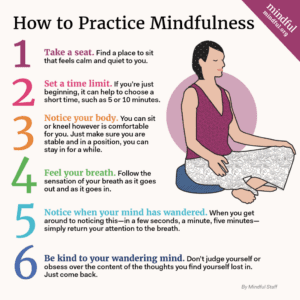
The Power of Mindfulness: Benefits for Physical and Mental Well-being
Unlock the Power of Mindfulness to navigate through the chaos of daily life and embrace a path that leads to genuine mental and physical well-being. By integrating mindfulness into our routine, not only do we connect with the present moment, enhancing our daily experiences, but we also unlock a realm where simple joys become the source of our happiness. Let’s explore together how mindfulness fortifies our mental and physical state, guiding us towards a balanced and enriched life Understanding Mindfulness: Mindfulness is the practice of intentionally focusing our attention on the present moment, without judgment. It involves being fully aware of our thoughts, feelings, bodily sensations, and the environment around us. This ancient practice has its roots in Buddhism but has gained significant attention in the scientific community for its profound effects on stress reduction, happiness, and overall health. The Mind-Body Connection: The mind and body are intricately connected, and when one is out of balance, it can impact the other. Mindfulness acts as a bridge, allowing us to cultivate a deeper connection between our thoughts, emotions, and physical sensations. By becoming more attuned to our bodies, we can better understand and address any physical discomfort or imbalances that may arise. The Science Behind Mindfulness: Numerous scientific studies have shown the effectiveness of mindfulness in improving both physical and mental health. One study conducted by Jon Kabat-Zinn, a renowned mindfulness expert, found that individuals who practiced mindfulness experienced significant reductions in symptoms of depression, anxiety, and chronic pain. Another study showed that mindfulness-based interventions were effective in reducing blood pressure and improving heart health. The Benefits of Mindfulness: The benefits of mindfulness are far-reaching and can positively impact various aspects of our lives. Let’s explore some of the remarkable advantages that come with incorporating mindfulness practices into our daily routine. 1. Enhanced Emotional Well-being: Mindfulness strengthens our emotional well-being by increasing our capacity to be fully present and engaged in the present moment. It allows us to savor life’s pleasures as they occur, fostering a greater appreciation for the simple joys that surround us. By practicing mindfulness, we can develop a greater resilience to adversity, reducing worries about the future or regrets about the past. This heightened emotional well-being also helps to form deeper connections with others, fostering more meaningful relationships. 2. Improved Physical Health: Beyond its impact on emotional well-being, mindfulness has been shown to improve physical health in numerous ways. It has been found to alleviate stress, a common precursor to many physical ailments. Regular mindfulness practice has also been linked to a reduction in heart disease risk factors, such as high blood pressure. Additionally, mindfulness can help relieve chronic pain, enhance sleep quality, and alleviate gastrointestinal difficulties. 3. Mental Health Benefits: Mindfulness has gained significant recognition as a valuable tool in the treatment of various mental health conditions. Studies have shown that mindfulness-based interventions are effective in reducing symptoms of depression, anxiety, substance abuse, eating disorders, and obsessive-compulsive disorder. By cultivating a non-judgmental awareness of our thoughts and emotions, mindfulness allows us to develop healthier coping mechanisms and a more positive outlook on life. How Mindfulness Works: To fully understand the benefits of mindfulness, it’s important to explore how it works. Mindfulness helps us accept our experiences, including painful emotions, without reacting to them with aversion or avoidance. By observing our thoughts and emotions without judgment, we can gain a greater perspective on them, allowing us to respond to them more effectively. Combining Mindfulness with Psychotherapy: Mindfulness meditation is often combined with psychotherapy, particularly cognitive-behavioural therapy (CBT). This integration makes sense, as both practices aim to help individuals gain perspective on irrational thoughts and develop healthier cognitive patterns. By incorporating mindfulness into therapy sessions, individuals can learn to cultivate a non-judgmental awareness that supports their mental well-being. Mindfulness Techniques: There are various techniques to practice mindfulness, and the goal of each is to achieve a state of focused relaxation by paying deliberate attention to our thoughts and sensations. Here are some commonly used mindfulness techniques: 1. Basic Mindfulness Meditation: One of the fundamental mindfulness practices is basic mindfulness meditation. Start by sitting quietly and focusing on your natural breathing or repeating a word or mantra silently. Allow thoughts to come and go without judgment, gently returning your attention to your breath or mantra. This practice helps to cultivate a sense of presence and awareness in the present moment. 2. Body Sensations: Another mindfulness technique involves noticing subtle body sensations, such as itching or tingling, without judgment. Take the time to observe each part of your body, from head to toe, paying attention to the physical sensations that arise. 3. Sensory Awareness: Engaging our senses is an effective way to practice mindfulness. Notice the sights, sounds, smells, tastes, and touches in your environment, labeling them without judgment, and allowing them to pass. 4. Emotion Acceptance: Mindfulness teaches us to allow emotions to be present without judgment. Practice naming your emotions, such as “joy,” “anger,” or “frustration,” and accept their presence without trying to suppress or control them. By embracing our emotions, we can develop a healthier relationship with them. 5. Urge Surfing: For those struggling with cravings or addictive behaviours, urge surfing can be a powerful mindfulness technique. Instead of fighting against cravings, mindfully observe how they manifest in your body. Replace the desire for the craving to go away with the knowledge that it will eventually subside. Mindfulness Meditation and Other Practices: Mindfulness can be cultivated through mindfulness meditation, a systematic approach to focusing our attention. While you can learn to meditate on your own through books or audio guides, seeking the support of an instructor or group can be beneficial. They can answer your questions, provide guidance, and help you stay motivated on your mindfulness journey. Getting Started: If you’re new to mindfulness meditation, it’s recommended to start with shorter sessions, gradually increasing the duration over time. Begin by finding a quiet and comfortable space, then follow these steps: Sit on a straight-backed chair or cross-legged
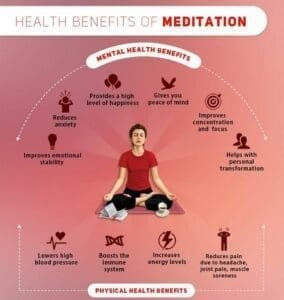
The Science-Backed Benefits of Mindfulness: How Being Present Can Transform Your Life
How Being Present Can Transform Your Life Welcome to a journey of self-discovery and transformation. In a world that constantly demands our attention, finding moments of peace and clarity can seem like an impossible task. But what if I told you that the key to unlocking a more fulfilling and meaningful life lies in the simple act of being present? Enter mindfulness – a practice rooted in ancient wisdom and backed by modern science. In this captivating exploration, we will delve into the science-backed benefits of mindfulness and discover how it can profoundly impact our physical and mental well-being. From reducing stress and anxiety to enhancing focus and creativity, mindfulness has the power to reshape our relationship with ourselves and the world around us. So, prepare to embark on a transformative journey as we uncover the secrets of mindfulness and learn how this practice can help us cultivate a deeper sense of joy, peace, and fulfillment in our lives. Let’s embark on this remarkable adventure together! The Science Behind Mindfulness Mindfulness is more than just a passing trend; it is a scientifically proven practice that has gained recognition in the fields of psychology and neuroscience. Research has shown that mindfulness can have a profound impact on our brain’s structure and function. Studies using functional magnetic resonance imaging (fMRI) have revealed that regular mindfulness practice can increase the size of the prefrontal cortex, the region responsible for executive functions such as attention, self-awareness, and emotional regulation. Furthermore, mindfulness has been found to decrease activity in the amygdala, the part of the brain responsible for the fight-or-flight response. This reduction in amygdala activity has been linked to a decrease in stress and anxiety levels. The science behind mindfulness is fascinating, and it provides a strong foundation for understanding the benefits that this practice can offer. Benefits of Mindfulness for Mental Health One of the most significant benefits of mindfulness is its positive impact on mental health. Numerous studies have shown that mindfulness can help reduce symptoms of depression and anxiety. By cultivating present-moment awareness, individuals can gain a greater sense of control over their thoughts and emotions. Mindfulness allows us to observe our thoughts without judgment, which can help break the cycle of rumination and negative self-talk that often accompanies mental health challenges. Moreover, mindfulness has been found to enhance emotional well-being by increasing positive emotions and decreasing negative emotions. This practice can help individuals become more attuned to their emotions, allowing them to respond to challenging situations with greater resilience and flexibility. Additionally, mindfulness has been shown to improve sleep quality, boost self-esteem, and increase overall life satisfaction. The benefits of mindfulness for mental health are wide-ranging and can have a transformative impact on our well-being. Benefits of Mindfulness for Physical Health While mindfulness is primarily associated with mental health, its benefits extend to physical health as well. Research has shown that mindfulness can help reduce blood pressure, lower heart rate, and improve immune function. By reducing stress and anxiety, mindfulness can have a positive impact on our physiological responses, leading to improved overall health. Furthermore, mindfulness has been found to contribute to pain management. Chronic pain can be debilitating and significantly impact one’s quality of life. However, studies have shown that mindfulness-based interventions can help individuals cope with pain and reduce their perception of pain severity. By shifting our attention away from the pain and focusing on the present moment, mindfulness can provide relief and improve our ability to manage pain. In addition to physical health benefits, mindfulness has also been found to support healthy eating habits and weight management. By bringing awareness to our eating behaviours and the sensations of hunger and fullness, mindfulness can help individuals develop a more mindful approach to eating, leading to healthier choices and improved overall well-being. Mindfulness and Stress Reduction Stress has become a prevalent issue in today’s fast-paced world, and finding effective ways to manage it is essential for our well-being. Mindfulness has emerged as a powerful tool for stress reduction. By focusing our attention on the present moment, mindfulness can help us break free from the cycle of worry and rumination that often accompanies stress. Research has shown that mindfulness-based stress reduction programs can significantly reduce perceived stress levels and improve overall resilience. By practicing mindfulness, individuals can become more aware of their stress triggers and develop healthier coping mechanisms. Mindfulness allows us to respond to stressors with greater calmness and clarity, enabling us to navigate challenging situations more effectively. Mindfulness and Emotional Well-being Our emotions play a significant role in our daily lives, influencing our thoughts, behaviours, and overall well-being. Mindfulness can help us cultivate a healthier relationship with our emotions by fostering greater self-awareness and acceptance. By observing our emotions without judgment, we can develop a more compassionate and non-reactive approach to our internal experiences. Studies have shown that mindfulness-based interventions can reduce symptoms of depression and anxiety by promoting emotional regulation and resilience. By becoming more attuned to our emotions, we can better understand their underlying causes and make conscious choices about how to respond to them. Mindfulness allows us to create a space between our emotions and our reactions, giving us the freedom to choose more adaptive and constructive responses. Mindfulness and Improved Cognitive Function In addition to its impact on mental and emotional well-being, mindfulness has been found to enhance cognitive function. Studies have shown that mindfulness practice can improve attention, working memory, and cognitive flexibility. By training our minds to focus on the present moment, mindfulness can help us overcome distractions and improve our ability to concentrate. Research has also demonstrated that mindfulness can enhance creativity. By quieting the mind and cultivating a state of open awareness, mindfulness can expand our capacity for divergent thinking and generate novel ideas. This creative boost can be particularly valuable in problem-solving, innovation, and artistic endeavours. Furthermore, mindfulness has been found to improve decision-making by reducing impulsive and automatic responses. By cultivating present-moment awareness, individuals can make more
